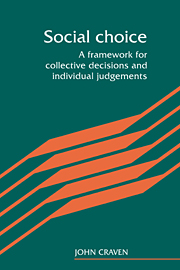8 - Justice
Published online by Cambridge University Press: 15 September 2009
Summary
Many people – even those who have liberal views about rights and freedoms – would argue that social justice involves caring about others, and particularly involves caring about the less well-off members of society. How can we formally incorporate this concern for justice into the theory of social choice? What principles of justice can be used consistently in the formation of judgements?
Impersonal principles of justice
For most of this chapter, we regard principles of justice as impersonal. We are not concerned with the well-being of a particular named individual but we can be concerned with impersonal descriptions of positions that individuals are in, such as the worst-off person or the one at the median of an income distribution. If there are n people in society, then each alternative description of society contains n positions.
An intellectual experiment for making such impersonal judgements is put forward by Rawls (1971, who justifies a particular view of justice which we discuss later). His argument is that principles of social justice should be determined behind a ‘veil of ignorance’. Imagine that you are designing an ideal society of which you will be a member, but you do not know which member you will be.
- Type
- Chapter
- Information
- Social ChoiceA Framework for Collective Decisions and Individual Judgements, pp. 123 - 132Publisher: Cambridge University PressPrint publication year: 1992



